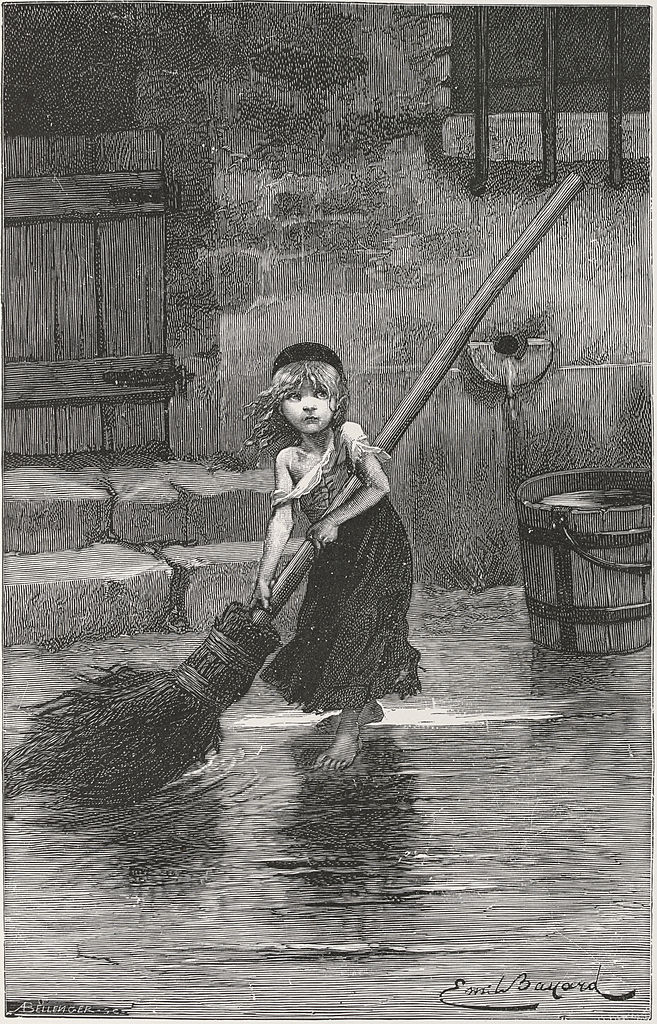Tyke, Imp, Waif, and Les Misérables


tyke means:
- 1. A small child, especially a boy.
- 2. A mongrel or cur.
[etymology of tyke https://www.etymonline.com/word/tyke] «c.1400, “cur, mongrel,” from O.N. tik “bitch,” related to M.L.G. tike. … The meaning “child” is from 1902, though it was used in playful reproof from 1894.»
mongrel means:
- 1. An animal or a plant resulting from various interbreedings, especially a dog of mixed or undetermined breed.
- 2. A cross between different breeds, groups, or varieties, especially a mixture that is or appears to be incongruous.
cur means:
- 1. A dog considered to be inferior or undesirable; a mongrel.
- 2. A base or cowardly person.
imp
A related, fitting word here is “imp”. It means:
- 1. A mischievous child.
- 2. A small demon.
[etymology of imp https://www.etymonline.com/word/imp] «O.E. impe, impa “young shoot, graft,” from impian “to graft,” …, verbal adjective formed from emphyein “implant,” from em- “in” + phyein “to plant” (see physic). Sense of “child, offspring” (late 14c.) came from transfer of word from plants to people, with notion of “newness” preserved. Modern meaning “little devil” (1580s) is from common use in pejorative phrases like imp of Satan.»
waif
Another, related word is “waif”, meaning: A homeless person, especially a forsaken or orphaned child.

Les Misérables (pronounced /leɪ ˌmɪzəˈrɑːb/ or /leɪ ˈmɪzəˌrɑːb/; French pronunciation: [le mizeʁabl(ə)]) is a French historical novel by Victor Hugo, first published in 1862, that is considered one of the greatest novels of the 19th century. In the English-speaking world, the novel is usually referred to by its original French title. However, several alternatives have been used, including The Miserables, The Wretched, The Miserable Ones, The Poor Ones, The Wretched Poor, The Victims and The Dispossessed.[1] Beginning in 1815 and culminating in the 1832 June Rebellion in Paris, the novel follows the lives and interactions of several characters, particularly the struggles of ex-convict Jean Valjean and his experience of redemption.[2]
Examining the nature of law and grace, the novel elaborates upon the history of France, the architecture and urban design of Paris, politics, moral philosophy, antimonarchism, justice, religion, and the types and nature of romantic and familial love. Les Misérables has been popularized through numerous adaptations for the stage, television, and film, including a musical and a film adaptation of that musical.
The appearance of the novel was highly anticipated and advertised. Critical reactions were diverse, but most of them were negative. Commercially, the work was a great success globally.
[Wikipedia Les Misérables]
[etymology of waif https://www.etymonline.com/word/waif] «late 14c., “unclaimed property, flotsam, stray animal,” from Anglo-Norm. waif, gwaif (early 13c.) “ownerless property,” probably from a Scandinavian source akin to O.N. veif “waving thing, flag,” from P.Gmc. *waif-, from PIE *weip- “to turn, vacillate, tremble ecstatically” (see vibrate). Cf. M.L. waivium “thing thrown away by a thief in flight.” A Scottish/northern English parallel form was wavenger (late 15c.). » «Meaning “person (especially a child) without home or friends” first attested 1784, from legal phrase waif and stray (1620s). Neglected children being uncommonly thin, the word tended toward this sense. Connotations of “fashionable, small, slender woman” began 1991 with application to childishly slim supermodels, for example: Kate Moss.»